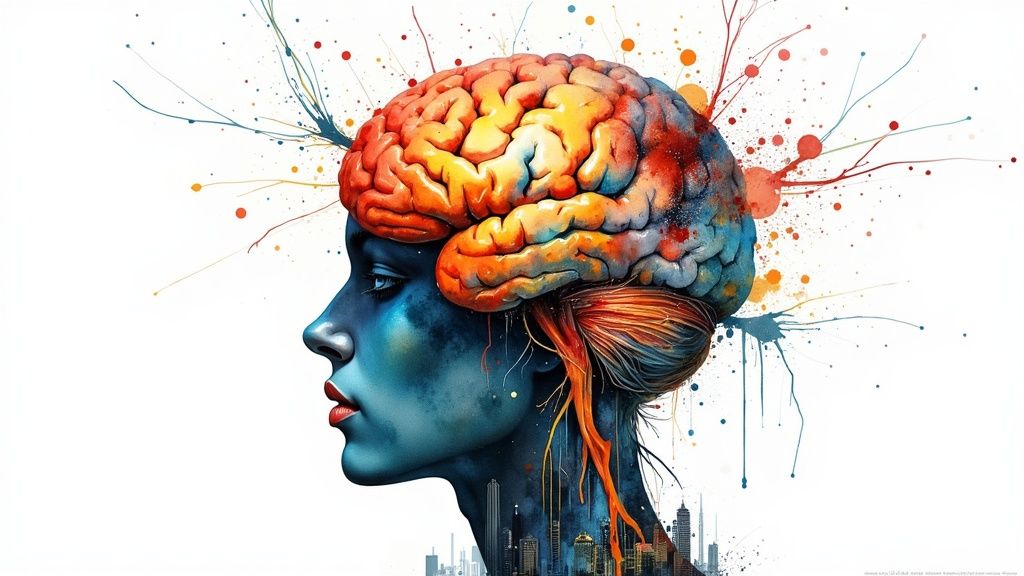Understanding The Power of AI in Marketing

AI-powered advertising has moved beyond theory into everyday marketing practice. The explosion of marketing data has made AI essential - there's simply too much information for humans to process effectively on their own. AI's ability to analyze vast datasets and extract meaningful insights is changing how marketers work and make decisions.
Key Ways AI Strengthens Marketing
AI gives marketers powerful new capabilities that were impossible just a few years ago. The technology can analyze individual customer behaviors to deliver personalized experiences at scale. For instance, AI algorithms can automatically segment audiences and customize content for different groups, leading to better engagement rates. It also handles time-consuming tasks like media buying and budget allocation, letting marketing teams focus on strategy and creativity.
Measurable Results from AI Marketing
Companies that embrace AI in their marketing are seeing concrete benefits. Many brands report their return on ad spend increasing by 300-500% after implementing AI-driven optimization. These improvements come from various AI applications - from predictive analytics that forecast campaign performance to smart systems that engage customers at the right moments with relevant messages.
Working Through Implementation Challenges
Adding AI to marketing operations takes careful planning and ongoing refinement. Teams need to integrate new AI tools with their existing tech stack while addressing important considerations around data privacy and ethical use. But working through these challenges pays off. Marketing teams that successfully adopt AI often experience breakthrough moments when they shift from gut-feel decisions to data-driven strategies that deliver consistently better results.
What's Next for AI Marketing
AI will play an increasingly central role in marketing's future. As the technology gets more advanced, we'll see AI assist with more aspects of marketing - from generating content to personalizing customer service to optimizing campaigns in real-time. For marketers looking to stay competitive and drive strong results, understanding and using AI is becoming essential. Industry forecasts showing massive growth in AI marketing spending in the coming years reflect this trend.
Mastering AI-Driven Content Personalization
Content personalization has become a key focus for marketers looking to create meaningful connections with their audiences. Building on what we've learned about AI's role in marketing strategy and campaign optimization, let's explore how this technology enables truly personalized customer experiences at scale.
Understanding the Nuances of AI-Powered Personalization
Modern AI systems excel at processing customer data to uncover subtle patterns in behavior and preferences. This deep analysis helps marketers deliver content that genuinely connects with individual customers. For instance, when an AI examines someone's browsing history, past purchases, and social media activity, it can accurately predict what products or content they'll find most appealing. This goes far beyond just using someone's name - it's about anticipating and meeting their specific needs through personalized product suggestions, targeted discounts, and customized email campaigns.
Achieving Higher Engagement with AI-Optimized Content
Major brands using AI personalization are seeing impressive results. When content truly matches what individual users want, engagement typically jumps 40-60%. This leads directly to stronger brand loyalty, better conversion rates, and increased revenue. Think about your own experience - you probably ignore generic ads for products you don't care about. But when you see a recommendation that perfectly fits what you need? You're much more likely to click and buy.
Implementing Personalization Strategies While Respecting Privacy
While personalization can drive great results, it needs to be done responsibly. Customer privacy should be a top priority, with clear communication about what data is being collected and how it will be used. Giving customers control over their data builds the trust needed for successful long-term relationships. For more insights on ethical AI use in advertising, check out our guide on AI in Advertising: The Future Is Now, And It's Pretty Smart.
Frameworks for Effective Personalization
To implement personalization effectively, follow this practical framework:
- Data Collection and Analysis: Gather customer data from your website, CRM, and social media. Use AI tools to find meaningful patterns and insights.
- Audience Segmentation: Group your audience based on shared traits and behaviors to enable more focused personalization.
- Content Creation and Delivery: Create targeted content for each segment, using AI to help produce and distribute it across channels.
- Performance Measurement and Optimization: Monitor key metrics like click-through rates and customer lifetime value. Keep refining your approach based on what works.
AI personalization helps build real connections with customers by delivering experiences they actually want. This drives better results across the board - but only when done ethically and with customer trust in mind. To learn more about AI's impact on advertising, check out AI in Advertising: The Future Is Now, And It's Pretty Smart.
Building Intelligent Customer Engagement Systems

As businesses seek to improve customer interactions, AI-powered systems are becoming essential tools for creating personalized, dynamic engagement. Companies are moving beyond basic automated responses to develop sophisticated solutions that not only handle inquiries but actively guide customers toward making purchases and becoming loyal customers.
The Psychology of Effective AI Chatbots
At its core, successful AI chat implementation depends on understanding how customers think and behave. A chatbot serves as your brand's digital representative, making it crucial that each interaction feels genuine and helpful rather than cold and automated. For example, when a chatbot can detect frustration in a customer's messages and respond with specific solutions, it creates a much better experience than generic responses. This human-like understanding helps build customer trust and encourages them to continue engaging with your business.
Driving Conversions Through Conversational AI
The results speak for themselves - businesses using advanced AI chat systems are seeing up to three times more qualified leads compared to traditional methods. This success comes from the chatbot's ability to provide instant support at any hour while analyzing customer data to make relevant product suggestions. When you combine this targeted approach with immediate responses, it creates a powerful tool for increasing sales. The data shows that quick, personalized interactions significantly boost the chances of converting browsers into buyers.
Creating Seamless Human-AI Collaboration
While AI handles many customer interactions effectively, human support remains vital. Some situations require a personal touch - whether it's a complex problem that AI can't fully address or simply a customer's preference to speak with a person. That's why smooth handoffs between AI and human agents are crucial. Well-designed systems can recognize when to transfer a conversation to a staff member, ensuring customers always get the right level of support. This combination of AI efficiency and human expertise creates the best possible experience for customers.
Implementing AI for Enhanced Customer Engagement
To successfully implement AI for customer engagement, follow these key steps:
- Define Clear Objectives: Set specific goals for what you want to achieve, whether that's generating more leads, improving satisfaction scores, or reducing wait times
- Choose the Right Tools: Pick AI solutions that work well with your current systems and help you meet your goals
- Design Conversational Flows: Build natural chat dialogues that connect with your target audience
- Train Your AI: Use relevant customer data to teach your AI system how to provide accurate, helpful answers
- Monitor and Optimize: Track performance metrics and regularly adjust your system to improve results
By following this approach, businesses can use AI to build engagement systems that not only work more efficiently but also create better customer relationships. Many companies see response times drop by up to 80% while actually improving the quality of customer interactions. When done right, this balance of speed and service quality helps businesses grow and succeed in competitive markets.
Using Predictive Analytics for Effective Campaign Results
AI and data analytics are changing how marketers plan and execute campaigns. By analyzing historical data patterns and forecasting future trends, predictive analytics helps marketers make smarter decisions based on real data rather than guesswork. This approach leads to better results and smarter budget allocation.
How Predictive Analytics Shapes Marketing Strategy
When marketers understand how customers are likely to behave, they can create more effective campaigns. For instance, by looking at past campaign performance data, AI systems can identify which audience segments have the highest chance of converting. This insight helps marketers focus their efforts and budget on the most promising opportunities. The data also reveals the best channel mix for reaching target audiences, eliminating wasteful spending.
Getting Better Results Through AI-Powered Insights
The numbers show just how much predictive analytics can improve marketing performance. Marketing teams using AI-driven prediction tools typically see campaign results improve by over 50%. This boost comes from several areas - placing ads where they'll perform best, creating more relevant messages for different audiences, and targeting the right people at the right time. The technology also helps cut waste by quickly spotting underperforming campaigns so marketers can shift resources to what's working best.
Real-World Applications of Predictive Analytics
Here's how marketers are putting predictive analytics to work:
- Smart Audience Targeting: AI analyzes customer data like demographics, past purchases and online behavior to group audiences into segments. This helps create highly focused campaigns that connect with specific groups.
- Smarter Budgeting: Predictive models show how to split budgets across different channels to get the best overall results.
- Content Performance: AI tracks which content works best with different audiences, helping shape more engaging content strategies.
- Bidding Optimization: AI algorithms adjust bids in real-time to get the best ad placements at competitive prices.
These examples show how AI helps improve many aspects of campaign management. For more on using data to guide marketing decisions, check out: How to master data analytics for marketers.
Starting with Predictive Analytics
To get the most from predictive analytics, follow these key steps:
- Get Your Data Ready: Make sure you have clean, reliable data from all your sources connected to your AI platform.
- Pick the Right Tools: Choose predictive models that fit your specific goals and the data you have.
- Keep Improving: Watch how your models perform and keep adjusting your approach based on what the data shows. Regular testing and updates are essential.
With predictive analytics, marketers gain deeper insights into their audiences, run better-performing campaigns, and see stronger returns on their marketing spend. The ability to use data to anticipate what will work helps marketers make smarter choices about where to focus their efforts and resources.
Human-AI Partnership in Marketing
The rise of AI in marketing isn't about replacing human talent - it's about combining the best of both worlds. While AI tools handle data analysis and campaign automation with incredible speed and precision, human marketers bring creativity, empathy, and strategic thinking that machines simply cannot replicate. When these strengths work together, marketing teams can achieve exceptional results.
The Power of Human + Machine Teams
AI technology works best as a powerful assistant to human marketers, not a replacement. For example, while AI can rapidly process customer data to identify promising audience segments, human marketers excel at crafting messages that genuinely connect with those audiences through storytelling and emotional resonance. This creates a natural division where each side can focus on what they do best - AI handles the data-heavy tasks while humans drive strategy and creative direction.
Key Skills for Success with AI
Working effectively with AI requires marketers to build new capabilities while leveraging their existing strengths. Understanding data analysis helps marketers interpret AI insights and turn them into action. Basic AI literacy enables teams to choose and use tools effectively while recognizing their limitations. Most importantly, successful marketers maintain curiosity and flexibility to keep learning as AI capabilities evolve. The most effective teams prioritize ongoing education and skill development.
Building Strong AI-Human Collaboration
Creating productive partnerships between marketers and AI goes beyond just adding new technology - it requires the right environment and support systems. This means investing in AI skill training, encouraging teams to experiment with new tools, and establishing strong communication between marketing and technical teams. When marketing and data science groups work closely together, AI insights can more effectively shape marketing strategy. For more on this topic, check out: The Top 10 AI Implementations of 2024 in Media and Marketing.
The Rise of the Hybrid Marketer
Success in modern marketing increasingly belongs to professionals who can bridge both human and AI capabilities. These "hybrid marketers" combine traditional marketing expertise with technical skills and deep customer understanding. The table below outlines the key skills these marketers need:
By developing these hybrid capabilities, marketing teams can fully tap into AI's potential while maintaining the human elements that make marketing truly effective. The future belongs to those who can thoughtfully blend both human and machine strengths.
Implementing AI Marketing Solutions That Work

Now that we understand the core concepts of AI in advertising, let's focus on practical steps for implementation. This section provides concrete strategies and actionable steps to integrate AI into your marketing activities in ways that deliver real results.
Evaluating AI Tools for Your Needs
With so many AI marketing tools available, choosing the right one requires careful consideration of your specific goals. If you want to create personalized content, look for tools specializing in natural language generation and audience analysis rather than programmatic advertising platforms. Consider factors like compatibility with your current technology stack, data security features, and vendor support quality. Taking time upfront to properly assess options will help avoid costly mistakes later and ensure smooth adoption.
Building Effective Workflows with AI
Success with AI marketing depends on thoughtfully designing workflows where AI and human marketers complement each other's strengths. AI excels at analyzing data and automating repetitive tasks, freeing up your team to focus on strategy and creativity. For example, while AI handles A/B testing different ad variations, marketers can devote more time to developing compelling campaign narratives and building customer relationships. This balanced approach gets the best results from both AI capabilities and human expertise.
Measuring the Impact of AI on Your Marketing Goals
Implementation is just the start - you need to actively track how AI affects your key metrics. Define clear performance indicators that align with your business objectives, such as conversion rates, ad spend returns, customer lifetime value, and brand awareness measures. Monitor these metrics consistently to understand what's working and what needs adjustment. This data-driven approach helps you continuously improve and optimize your AI marketing strategy over time through testing and refinement.
Planning, Launching, and Scaling Your AI Initiatives
Take a methodical approach when deploying AI in your marketing. Begin with a focused pilot project in one area, such as email personalization or social media ads. This allows you to test and refine your AI processes in a controlled way. Once you see positive results and gain confidence, gradually expand to other marketing channels and campaigns. This measured expansion reduces risks while increasing your chances of long-term success. With the AI marketing sector expected to reach $107.5 billion by 2028, starting now puts you in a strong position for the future.
Ready to transform your video content creation process? Aeon is an AI-powered video platform that helps publishers create engaging videos with minimal effort. From converting text to video to formatting content for social media, Aeon makes video production simple and effective. Visit https://www.project-aeon.com today to learn more and see how it can enhance your video creation workflow.